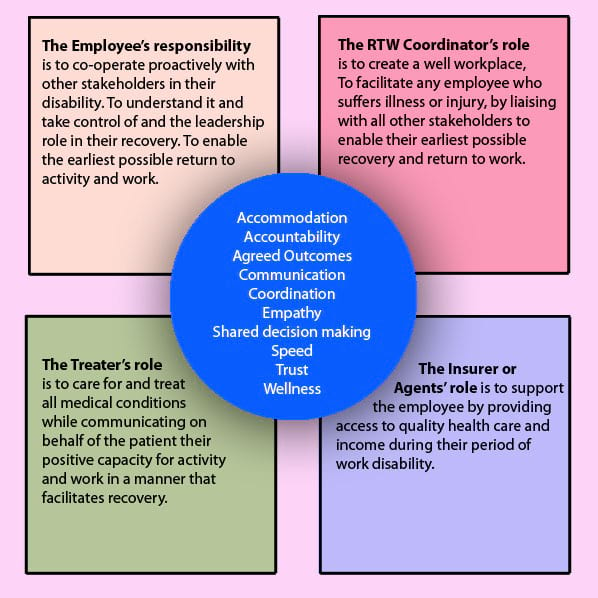The Principles Underlying RTW - Draft 2

Thanks to everyone who gave us feedback on the 1st draft.
In this second draft of the principles underlying best practise RTW we incorporate those thoughts and revise the model. It is clear people think we need to end up with a one page document if possible. Something easy to read and comprehend. Given the complexity, that may not be so easy, so we'll trial a format below and seek your opinion.
Some people have suggested that all participants in RTW must have an 'intent' or 'willingness' to act, that an agreed outcome must be established at the outset.
Other discussion suggests claimant accountability should be highlighted - that claimants are given financial support, but have responsibilities in return. That is, the injured or ill person is responsible for taking the lead role in their own recovery. Their responsibility is not to be the passive recipient of a benefit, the victim of a health condition. But to actively get better, by understanding the nature of their health condition, by being clear about any treatment provided, and by taking control of their own return to health and activity. Some suggest this accountability should be stated as a fundamental principle. Your thoughts?
As an aside to this, the word 'compensation' may in fact be inappropriate in workers' health legislation. The meaning of 'compensation' here is a payment in remedy of a past injury or illness. If the focus is on the compensation, the focus is on the compensation. Maintenance of the negative health condition is the basis of ongoing income. Perhaps the workers' compensation system should be renamed the workers' rehabilitation system.
If nothing else this article has revealed that people see the responsibilities of the employer and the employee quite differently. Views are strongly held - as heated discussion in the office about this article has revealed. What do you think? What is the claimant's responsibility?
Is RTW an investment in a worker's positive capacity? Does a claimant have a responsibility, a leadership role to play, in returning to health and activity?
Is the RTW focus more appropriately on health, rather than sickness or injury? Is RTW a remedy for the past, or is it an investment in the future?
And what are the benefits of focusing on capacity ahead of limitation?
One unexpected thing we have added as a principle of RTW for your consideration is 'wellness'.
But that doesn't cover everything we are trying to scratch at above, we are not entirely sure what words to use there.
On another subject if we are going to present The Principles of RTW on one page then it has to be diagrammatic. How about this idea - the text is loose, but what do you think?
 :
:
Does it tell the story? What's missing?
We're looking forward to your ideas. Please email
Published 06 July, 2009

